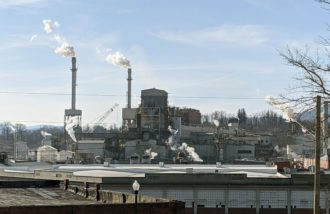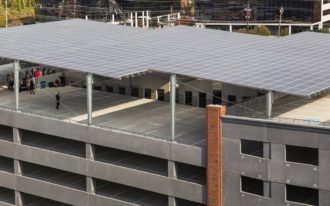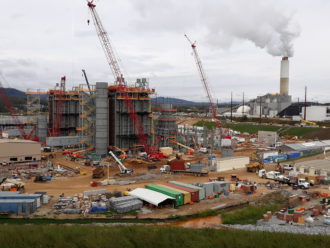“This illegal mining threatens to permanently alter one of the Southeast’s premier whitewater rivers, with catastrophic consequences for local communities, wildlife and future generations.”


“This illegal mining threatens to permanently alter one of the Southeast’s premier whitewater rivers, with catastrophic consequences for local communities, wildlife and future generations.”

Asheville-based nonprofit MountainTrue and others await responses from the U.S. Forest Service after filing a flurry of legal actions since the federal agency finalized its Pisgah-Nantahala Forest Plan last year.

The Southern Environmental Law Center and five other conservation groups issued the USFS a notice of intent to sue in July on the grounds that it ignored its own scientific findings suggesting that logging in certain areas could drastically harm the habitat and feeding grounds of four already endangered species, therefore violating the Endangered Species Act. If filed, the case will be heard in the U.S. District Court for the Western District of North Carolina.

The recent decision to harvest 26 acres that encompass an old-growth patch of forest on a 3,500-foot mountaintop – the Southside Project – underscores what some say is the widening incongruity between the U.S. Forest Service’s mission, climate change crisis and the public’s will.

Scientists say old-growth forests are essential tools in the fight against climate change. Harvesting them releases greenhouse gasses, worsening climate impacts.

The Southern Environmental Law Center plans to file an objection over acreage perceived as being left at risk under U.S. Forest Service plan for Western North Carolina’s national forests.

In town known for a foul smell and a river that used to run black, the Canton paper mill has made strides in cleaning up, and jobs depend on the facility. But environmentalists say concerns persist.

Deteriorating forest roads damage the ecosystem and limit access essential for forest management and the forest-product economy.

Together, the city of Asheville and Buncombe County approved over $11 million in funding to install roughly 7 megawatts of solar power at public facilities and area schools. The projects are anticipated to save the governments and local schools roughly $650,000 in electricity costs in the first year and more than $27 million over the installations’ 30-year operational life.

Mike Diethelm, president and founder of Asheville-based SolFarm Solar Co., says a $10 million construction bond requirement for would-be bidders on the solar projects “knocks out so many local medium and small solar businesses, which we have a lot of in this town, and only opens it up to the big guys.”

Judy Mattox, chair of the Western North Carolina Sierra Club Group, shared her top five highlights from a year of advocacy with Mountain Xpress.

The new facility’s planned retirement is in 2059 — 17 years after Buncombe County government’s 2042 goal of transitioning all homes and businesses to completely renewable energy. Jason Walls, Duke Energy district manager, said his company is committed to helping local governments achieve their goals but that the new plant’s construction is based on forecasts of growing energy needs.

Local legislators and environmental advocates share their thoughts on which state budgetary and policy decisions could have a big impact on WNC’s environment in the coming fiscal year and beyond. They cited issues including the state’s response to novel contaminants like GenX chemicals, the budget for the N.C. Department of Environmental Quality and funding for the Clean Water Management, Parks and Recreation and Farmland Preservation trust funds.

For 70 years, the Minerals Research Laboratory on Coxe Avenue has collaborated with mining companies and educational institutions to develop more efficient processes for extracting the state’s mineral resources as well as ways to reuse potentially harmful byproducts.

After a Monday, Feb. 22 hearing disrupted several times by protests, the chair of the state Utilities Commission said he expects to meet a legislative deadline for a decision on Duke Energy-Progress’ conversion of its Asheville facility. Duke warned that it may not phase out its coal-fired units at the site if its petition is denied.